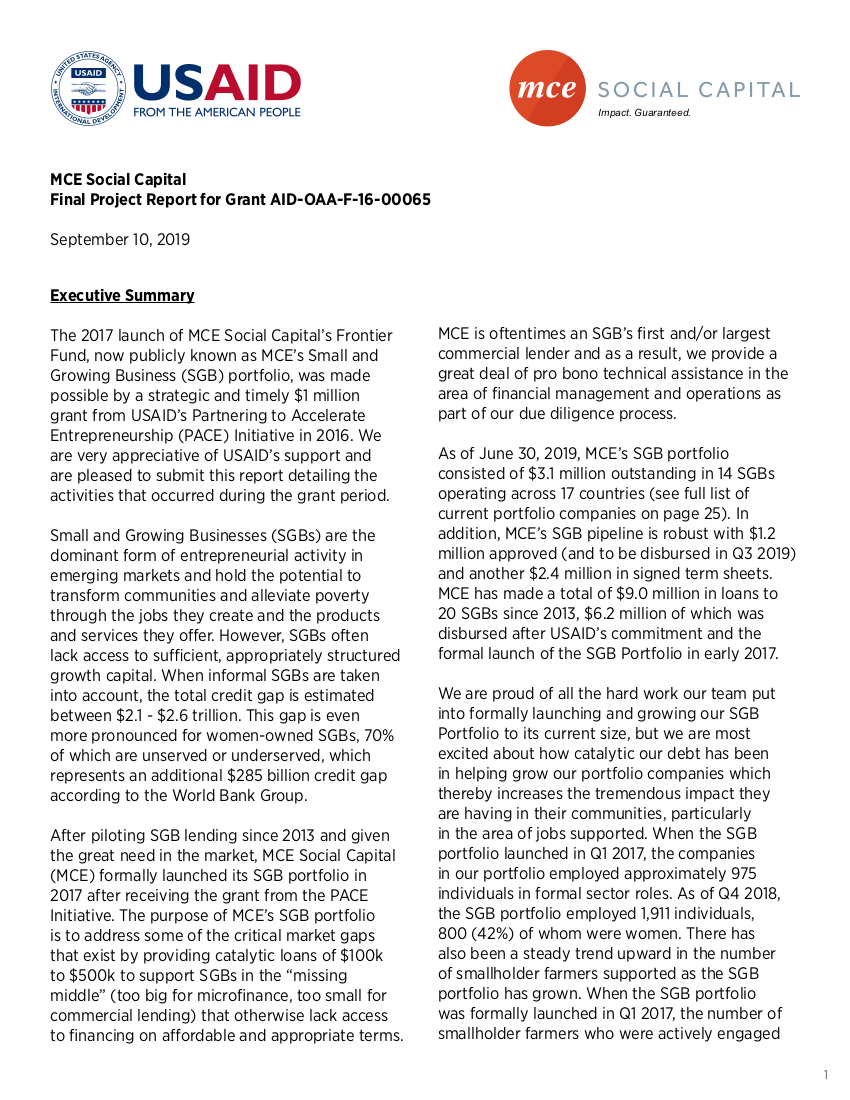- What We Do
- Agriculture and Food Security
- Democracy, Human Rights and Governance
- Economic Growth and Trade
- Education
- Environment and Global Climate Change
- Gender Equality and Women's Empowerment
- Global Health
- Humanitarian Assistance
- Transformation at USAID
- Water and Sanitation
- Working in Crises and Conflict
- U.S. Global Development Lab
Speeches Shim
MCE Social Capital
Executive Summary
The 2017 launch of MCE Social Capital’s Frontier Fund, now publicly known as MCE’s Small and Growing Business (SGB) portfolio, was made possible by a strategic and timely $1 million grant from USAID’s Partnering to Accelerate Entrepreneurship (PACE) Initiative in 2016. We are very appreciative of USAID’s support and are pleased to submit this report detailing the activities that occurred during the grant period.
Small and Growing Businesses (SGBs) are the dominant form of entrepreneurial activity in emerging markets and hold the potential to transform communities and alleviate poverty through the jobs they create and the products and services they offer. However, SGBs often lack access to sufficient, appropriately structured growth capital. When informal SGBs are taken into account, the total credit gap is estimated between $2.1 - $2.6 trillion. This gap is even more pronounced for women-owned SGBs, 70% of which are unserved or underserved, which represents an additional $285 billion credit gap according to the World Bank Group.
After piloting SGB lending since 2013 and given the great need in the market, MCE Social Capital (MCE) formally launched its SGB portfolio in 2017 after receiving the grant from the PACE Initiative. The purpose of MCE’s SGB portfolio is to address some of the critical market gaps that exist by providing catalytic loans of $100k to $500k to support SGBs in the “missing middle” (too big for microfinance, too small for commercial lending) that otherwise lack access to financing on affordable and appropriate terms.
MCE is oftentimes an SGB’s first and/or largest commercial lender and as a result, we provide a great deal of pro bono technical assistance in the area of financial management and operations as part of our due diligence process.
As of June 30, 2019, MCE’s SGB portfolio consisted of $3.1 million outstanding in 14 SGBs operating across 17 countries (see full list of current portfolio companies on page 25). In addition, MCE’s SGB pipeline is robust with $1.2 million approved (and to be disbursed in Q3 2019) and another $2.4 million in signed term sheets. MCE has made a total of $9.0 million in loans to 20 SGBs since 2013, $6.2 million of which was disbursed after USAID’s commitment and the formal launch of the SGB Portfolio in early 2017.
We are proud of all the hard work our team put into formally launching and growing our SGB Portfolio to its current size, but we are most excited about how catalytic our debt has been in helping grow our portfolio companies which thereby increases the tremendous impact they are having in their communities, particularly in the area of jobs supported. When the SGB portfolio launched in Q1 2017, the companies in our portfolio employed approximately 975 individuals in formal sector roles. As of Q4 2018, the SGB portfolio employed 1,911 individuals, 800 (42%) of whom were women. There has also been a steady trend upward in the number of smallholder farmers supported as the SGB portfolio has grown. When the SGB portfolio was formally launched in Q1 2017, the number of smallholder farmers who were actively engaged with our portfolio companies was 9,434. As of Q4 2018, this number was 26,783. While the number of male and female smallholder farmers remained relatively equal throughout 2017, there was a notable uptick in female suppliers in 2018, who represented 58% at year-end.
MCE believes the type of lending we do is critically important to the field and should be replicated and scaled, but philanthropic subsidy will continue to be an important ingredient for our organization and others bravely tackling this area of the market. There is a reason we don’t run into many other organizations doing this type of lending as the work is time-consuming and therefore very expensive, particularly for the size of loans that we seek to make (below $500k). For most lenders, it is impossible to justify pursuing such opportunities where the costs are high and returns low (if any return at all) when other opportunities exist.
MCE is a mission-driven organization committed to supporting this vital market until it becomes more competitive, efficient, and therefore more attractive to commercial markets. However, until the market gets to that point, additional subsidy/ lender incentives within the field is needed, hence why we will continue to pursue grant support from critical, forward-thinking partners like USAID.


Comment
Make a general inquiry or suggest an improvement.